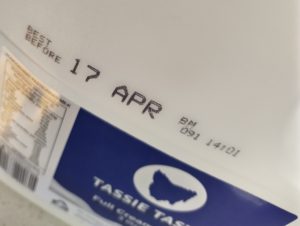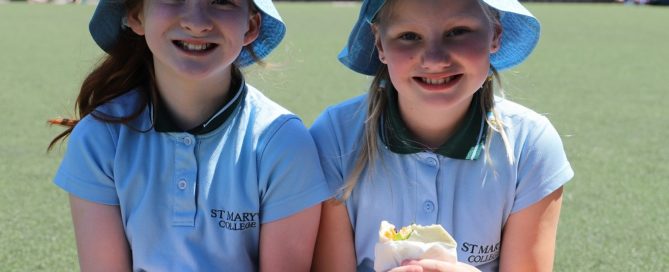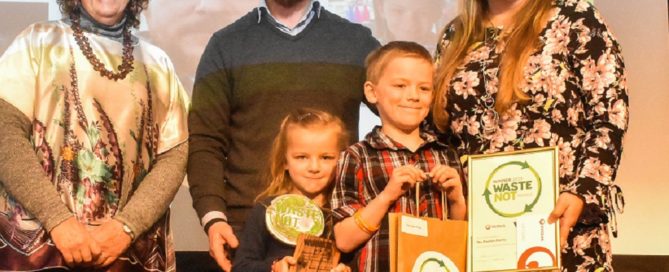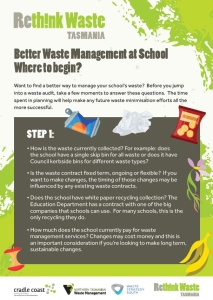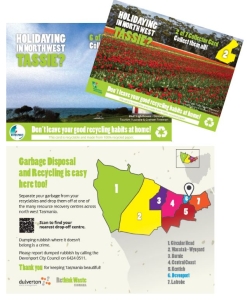The winners of the sixth annual Waste NoT Awards have been announced, with nine projects selected across several categories for their innovative waste management initiatives in Northern Tasmania.
Early Learners Category
WINNER:
Harper Ling – Harper was nominated by her parents in the Early Learners category for her project “Clean up Local”. Harper is 6 years old and she started her Clean up Local campaign earlier this year after she visited a rubbish-ridden beach and decided it was time to change. Her family helped her launch the Clean Up Local campaign on Facebook in April 2019 calling for volunteers one Sunday each month to pick up as much litter as they could find in one hour. August’s clean-up was held at the playground on Lilydale road, Rocherlea and previous to this they did a clean-up on the East Tamar highway which resulted in 15 full bags of rubbish being removed. This is an ongoing project that Harper is very passionate about and each month Clean up Local are getting more and more volunteers.
WINNER:
GlenDhu Childrens Services – In 2018 GlenDhu Children’s Services were moved by the iconic diver who filmed his dive with plastic floating all around him. The children of GlenDhu Children’s Services wondered how all the rubbish got there, where it came from and what would happen. This led to an educational journey of research and investigation with day to day consumption becoming their focus and the war on waste project began. Part of their project included identifying lunch box item packaging that could be swapped for more sustainable options and introducing a REDcycle and FOGO bin. During this project, they learnt that many simple changes can make a big difference. The children are now working on a poster to present to local supermarkets highlighting the issue of single use plastics packaging.
Primary School Category
WINNER:
Trevallyn Primary School – Trevallyn Primary were selected for their project ‘Waste at the Taste’ which come about in an effort to increase the community’s uptake of recycling and composting at the annual school fair. Trevallyn Primary created a YouTube video to educate patrons on what can go in each bin in preparation for the fair. Though their efforts they saved over 150kgs from going into landfill.
Secondary School Category
WINNER:
Deloraine High School – Deloraine High School were selected for their sustainable community’s project which involved a group of grade 9/10 students from the new 10 week short course working to make the community more sustainable. Some of the things the students completed as part of the project were two waste audits; litter surveys & they designed and installed a new five-bay recycling bin bank and a water bottle refilling station. The students also hosted a sustainability event to inform and engage over 300 staff and students including students from the neighbouring primary school and encouraged students to take part in the new recycling initiatives implemented by the group.
Colleges/Tertiary Institutions Category
WINNER:
Launceston College STEAM Team – This unique project involved the college students creating their own plastics recycling plant that would recycle their 3D print waste material. By creating the facility at the college this enabled the students to explore the entire recycling process, close the loop and allow students to understand the challenges and success of recycling plastic. They are now recycling other materials including their HDPE and LDPE and the whole college is getting involved by providing the STEAM team with plastic bottles to recycle. This project has attracted attention across the state – it’s the first of its kind and could be replicated in other schools.
Small – Medium Organisations Category
WINNER:
Vibestown Productions – Vibestown Productions were selected for their project at the 2019 Party in the Paddock Festival. This annual music festival is held in White Hills over 4 days and attracts over 8000 revellers with the majority of those camping on site. The waste reduction and management project was implemented and managed by a small team of event staff and over 100 volunteers. Water bottle refill stations were in place to eliminate all single use plastics use, they also had a cup refund scheme where patrons purchased their cup, enjoyed their beverages and either returned for another round or returned the cup to get their deposit back.
Individuals Category
WINNER:
The Poulton Family – The Poultons are being recognised for their bread bag challenge which began when their son Callen came home from school asking why they don’t do soft plastic recycling. When the family decided to put another bin in the cardboard box that they use as a rubbish bin there was not much room for both bags so they used a bread bag as the rubbish bag, which led to the idea of the bread bag challenge. The challenge was to reduce their weekly landfill waste to a bread bag, after achieving this and maintaining it for several months, the family decided to use social media to challenge their friends and family.
The Poulton Family and their Bread Bag Challenge was also selected by the judges as the overall winner in the 2019 Waste NoT Awards – Congratulations!
Not For Profit/Community Group Category
WINNER:
Harvest Launceston Community Farmers Market – Harvest Market was recognised for their commitment to achieving sustainable waste management practices. As an iconic and reputable community event held every Saturday it became apparent that Harvest needed to be a leader in this space and so a strategic decision to become a zero-waste event by 2021 was put in place. The first step was to identify the waste being created and so a waste audit took place. The audit showed that 95% of waste was compostable. When City of Launceston launched their FOGO service in 2018 it was not commercially available at that stage so Harvest worked with the Council to make it happen. There are 4 FOGO bins in central locations and the market entry/exit points, the bins are monitored by volunteers and signage has been erected. To launch Harvest’s first FOGO, special guest Costa from Gardening Australia gave it the thumbs up.
State/Local Government Category
WINNER:
Break O’Day Council – selected for their unique project called Hook, Line & Sinker. This project come about after community consultation on reducing waste and looking after the environment. In an effort to reduce marine waste, Council introduced Hook, Line & Sinker collection containers on jetties and the wharf. The containers are a simple design made from repurposed PVC pipe. The containers are located in visible areas with an aim to provide a place for fishers to discard used hooks and sinkers as well as tangled line rather than tossing it in the bay, threatening the marine wildlife and polluting the beaches.

